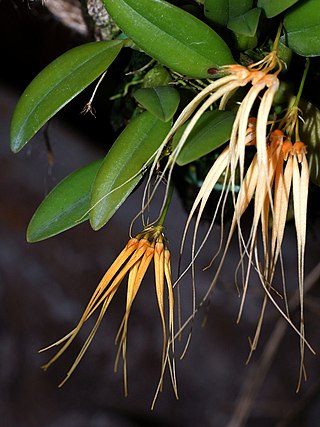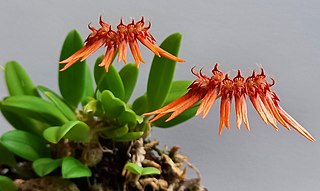
The Vitaceae are a family of flowering plants, with 14 genera and around 910 known species, including common plants such as grapevines and Virginia creeper. The family name is derived from the genus Vitis.

Curcuma is a genus of plants in the family Zingiberaceae that contains such species as turmeric and Siam tulip. They are native to Southeast Asia, southern China, the Indian Subcontinent, New Guinea and northern Australia. Some species are reportedly naturalized in other warm parts of the world such as tropical Africa, Central America, Florida, and various islands of the Pacific, Indian and Atlantic Oceans. Generally, most curcuma grows well in loose and sandy soil in shaded areas.

Magnolia wilsonii, or Wilson's magnolia, is a species of Magnolia native to China, in the provinces of western Guizhou, Sichuan and northern Yunnan, where it grows in the forest understory at altitudes of 1,900-3,000 m, rarely up to 3,300 m.
Dalbergia entadoides is a species of liana, found in Cambodia, Laos, Thailand and Vietnam: with the Vietnamese name trắc bàm. The genus Dalbergia is placed in the subfamily Faboideae and tribe Dalbergieae; no subspecies are listed in the Catalogue of Life.

Ormosia is a genus of legumes. 131 living species, mostly trees or large shrubs, are native to the tropical Americas, from southwestern Mexico to Bolivia and southern Brazil, to southern, southeastern, and eastern Asia, and to New Guinea and Queensland. Most are tropical, while some extend into temperate temperate regions of China. A few species are threatened by habitat destruction, while the Hainan ormosia is probably extinct already.

Actinidia pilosula is a species of plant in the Actinidiaceae family. It is endemic to China. The Tibetan people of Shangri-La and nearby areas eat its fruit.
Magnolia fistulosa is a species of plant in the family Magnoliaceae. It is endemic to China.
Trigonostemon fragilis is a species of plant in the family Euphorbiaceae. It is endemic to Vietnam.

Bulbophyllum pecten-veneris is a flowering plant in the family Orchidaceae. It is a species of orchid that is also known as the yellow-flowered bulbophyllum or golden comb orchid.
Bulbophyllum chondriophorum is a flowering plant in the family Orchidaceae. Within the genus Bulbophyllum it is in section Cirrhopetalum.
Bulbophyllum emarginatum is a species of orchid in the genus Bulbophyllum.
Bulbophyllum evrardii is a flowering plant in the family Orchidaceae.
Bulbophyllum fibratum is flowering plant in the family Orchidaceae.

Bulbophyllum hirundinis is a flowering plant in the familiy Orchidaceae.
Bulbophyllum kontumense is a flowering plant in the family Orchidaceae that is endemic to Vietnam.
Bulbophyllum laoticum is a flowering plant in the family Orchidaceae.
Bulbophyllum mediocre is a species of orchid in the genus Bulbophyllum.

Bulbophyllum pectinatum is a species of orchid in the genus Bulbophyllum.
Bulbophyllum pinicola is a flowering plant in the family Orchidaceae. It is a species of orchid characterized by its unique floral structure. It typically produces small reddish, and brown flowers that are borne on pendulous inflorescences. The flowers often have intricate patterns and shapes, which is typical of many Bulbophyllum species. The plant is epiphytic, meaning it grows attached to the other plants rather than in soil.







